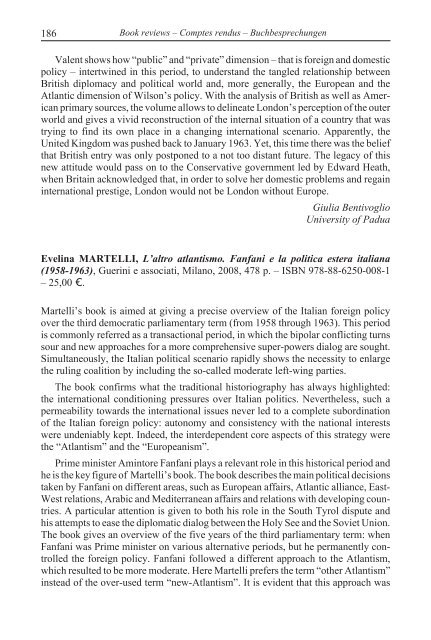Journal of European Integration History - Centre d'études et de ...
Journal of European Integration History - Centre d'études et de ...
Journal of European Integration History - Centre d'études et de ...
You also want an ePaper? Increase the reach of your titles
YUMPU automatically turns print PDFs into web optimized ePapers that Google loves.
186<br />
Book reviews – Comptes rendus – Buchbesprechungen<br />
Valent shows how “public” and “private” dimension – that is foreign and domestic<br />
policy – intertwined in this period, to un<strong>de</strong>rstand the tangled relationship b<strong>et</strong>ween<br />
British diplomacy and political world and, more generally, the <strong>European</strong> and the<br />
Atlantic dimension <strong>of</strong> Wilson’s policy. With the analysis <strong>of</strong> British as well as American<br />
primary sources, the volume allows to <strong>de</strong>lineate London’s perception <strong>of</strong> the outer<br />
world and gives a vivid reconstruction <strong>of</strong> the internal situation <strong>of</strong> a country that was<br />
trying to find its own place in a changing international scenario. Apparently, the<br />
United Kingdom was pushed back to January 1963. Y<strong>et</strong>, this time there was the belief<br />
that British entry was only postponed to a not too distant future. The legacy <strong>of</strong> this<br />
new attitu<strong>de</strong> would pass on to the Conservative government led by Edward Heath,<br />
when Britain acknowledged that, in or<strong>de</strong>r to solve her domestic problems and regain<br />
international prestige, London would not be London without Europe.<br />
Giulia Bentivoglio<br />
University <strong>of</strong> Padua<br />
Evelina MARTELLI, L’altro atlantismo. Fanfani e la politica estera italiana<br />
(1958-1963), Guerini e associati, Milano, 2008, 478 p. – ISBN 978-88-6250-008-1<br />
– 25,00 €.<br />
Martelli’s book is aimed at giving a precise overview <strong>of</strong> the Italian foreign policy<br />
over the third <strong>de</strong>mocratic parliamentary term (from 1958 through 1963). This period<br />
is commonly referred as a transactional period, in which the bipolar conflicting turns<br />
sour and new approaches for a more comprehensive super-powers dialog are sought.<br />
Simultaneously, the Italian political scenario rapidly shows the necessity to enlarge<br />
the ruling coalition by including the so-called mo<strong>de</strong>rate left-wing parties.<br />
The book confirms what the traditional historiography has always highlighted:<br />
the international conditioning pressures over Italian politics. Nevertheless, such a<br />
permeability towards the international issues never led to a compl<strong>et</strong>e subordination<br />
<strong>of</strong> the Italian foreign policy: autonomy and consistency with the national interests<br />
were un<strong>de</strong>niably kept. In<strong>de</strong>ed, the inter<strong>de</strong>pen<strong>de</strong>nt core aspects <strong>of</strong> this strategy were<br />
the “Atlantism” and the “<strong>European</strong>ism”.<br />
Prime minister Amintore Fanfani plays a relevant role in this historical period and<br />
he is the key figure <strong>of</strong> Martelli’s book. The book <strong>de</strong>scribes the main political <strong>de</strong>cisions<br />
taken by Fanfani on different areas, such as <strong>European</strong> affairs, Atlantic alliance, East-<br />
West relations, Arabic and Mediterranean affairs and relations with <strong>de</strong>veloping countries.<br />
A particular attention is given to both his role in the South Tyrol dispute and<br />
his attempts to ease the diplomatic dialog b<strong>et</strong>ween the Holy See and the Sovi<strong>et</strong> Union.<br />
The book gives an overview <strong>of</strong> the five years <strong>of</strong> the third parliamentary term: when<br />
Fanfani was Prime minister on various alternative periods, but he permanently controlled<br />
the foreign policy. Fanfani followed a different approach to the Atlantism,<br />
which resulted to be more mo<strong>de</strong>rate. Here Martelli prefers the term “other Atlantism”<br />
instead <strong>of</strong> the over-used term “new-Atlantism”. It is evi<strong>de</strong>nt that this approach was

















